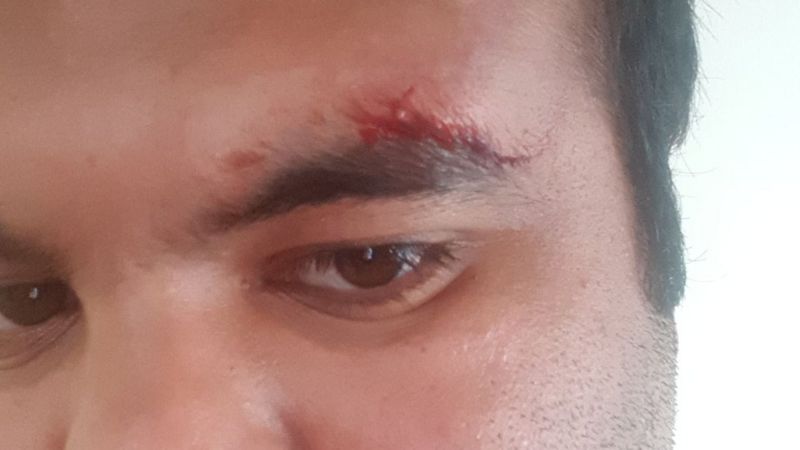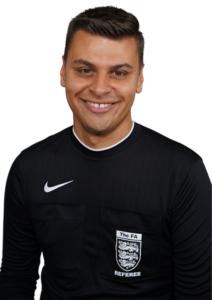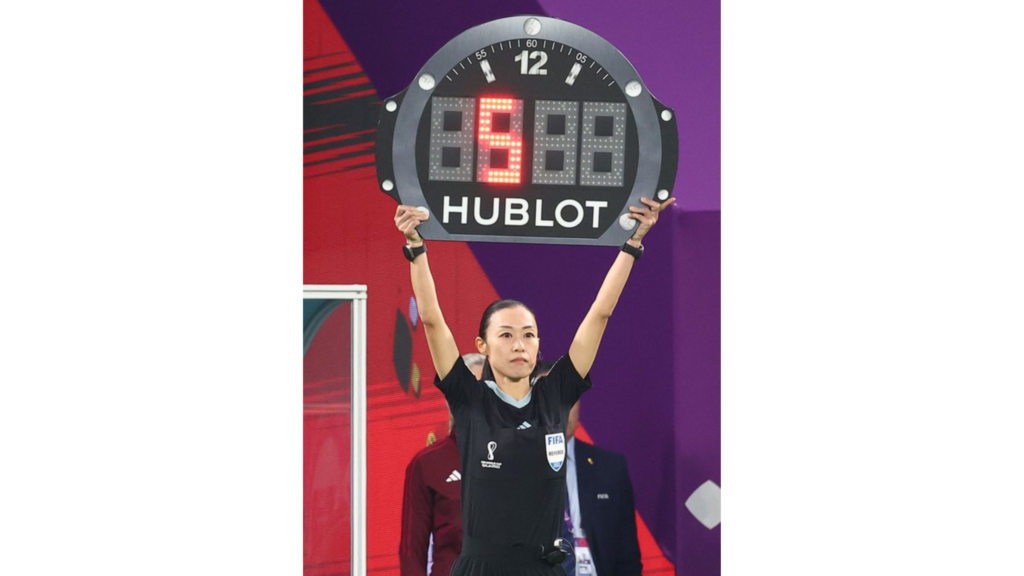Hello and welcome to the 200th edition of The Third Team Blog. I’ve been writing these articles, every Friday, for nearly four years now. In the calendar year of 2022, the number of readers exceeded 1 million people. I’m always delighted when readers get in touch and tell me how much the Blog has helped them, some have even become clients. So, what to write about in this milestone article? Where better to go than right back to the start. I hope you enjoy this enhanced, bonus content, version of the very first Third Team Blog!
The role of a referee is highly pressured, many people would argue. Officials’ decisions are scrutinised at all levels by players, club officials, spectators, and pundits. At grassroots level, pundits views, thankfully, don’t come into the equation however players, club officials, spectators, get passionately involved in matches and their frustrations often spill over which can provide a challenges for referees.
An officials role can be very difficult, below I share my top 5 challenges:
Top 5 Challenges
Match Control
To what extent can we control or influence a game we’re refereeing? What factors can’t we control? How much control should we strive for? Should we let things be as they are?
Let’s look at the uncontrollable variables, this is where we, as officials, have no control over or cannot influence the outcome in our favour. Such variables are, the weather condition, playing teams, the venue, spectators, how much time left in the game or to some extent, our colleagues. The list of things not in our control are endless.
Conversely, let’s consider what we can control, which is ‘US’ more specially our Attention and our Focus. Attentional control relates to how a referee can focus awareness onto the environmental stimuli that are most relevant during the task. The process of attending selectively to the most important cues involve concentration.
- Becoming self-aware of the controllables vs. uncontrollables – Make two lists. One list should be the controllables, which are those factors officials can do something about. The other list should be the uncontrollables, which are the elements of performance referees cannot do anything about.
- Create a “What if” plan, this can help prepare you for any obstacles or challenges you may encounter in the ever-changing, fast-paced, unpredictable environment of the field of play. Address the things you really fear in the game. Just list them all. Then address them one by one, asking yourself, is it controllable or not and if it happens I will….
- Concentration cues, highlight and develop a list of correct cues officials should be focussing on when following and off the ball. Use trigger words or short phrases to reinforce specific concentration cues for a task or skill i.e “drop back” or “run towards the corner flag”.
- Incorporate simulation pressure games or drills to train positive responses to adversity (e.g. Use time pressure, making a decision on a Key Match Decision (KMD) or bad movement and positioning etc.).
Dealing With Unexpected Challenges
Conditions aren’t always perfect on a matchday. Rain, excessive heat, poor pitch condition, partisan fanbases and facilities unfit for purpose are just a few things that can steal your focus prior to heading out into the middle.
It is more than likely that you have refereed a game where an unexpected incident occurred. Did it knock you off your game? Maybe it took you away from concentrating on the next set of decisions you needed to make, or perhaps you were unable to regain your focus and, consequently, your performance suffered for the remainder of the fixture.
The challenge for many officials is that they, too often, prepare for smooth-running events, expecting everything to go according to plan. While there may be ideal conditions for refereeing, they come few and far between. Something unexpected will happen in most games, there will always be a bump in the road somewhere over the course of the 90 minutes, if not several bumps. But an unexpected incident does not need to be an unfortunate incident so long as you prepare for the unexpected.
Most officials do not plan for the unexpected, incorrectly assuming that this encourages difficult conditions. There is nothing further from the truth. Top referees mentally prepare for some unexpected events, thus, training their minds to cope with distractions and adapt to circumstances.
To overcome this challenge, create some ‘if/then’ scenarios. For example, “If a player makes a serious foul play tackle and I am surrounded before I have time to go through my discipline procedure, then I will pause, take a deep breath, bring the situation under control and then re-focus on the first thing I needed to do.”
After you have some scenarios created, rehearse them in practice. Have a colleague cause a distraction, then perform your re-focusing strategy.
The Rise In Referee Abuse
First and foremost, officials are human beings and a great many of them are actually children! Whether they are 14 or 52 years old, they are living, breathing, impressionable and they have feelings. We seem to recognise this in the classroom or workplace when we call them “students” and “co-workers”. The best teachers and senior leaders in industry set their agendas with patience, support and encourage them with constructive feedback and praise, and create a safe development environment where they are allowed to make mistakes and fail, because it is widely accepted that this is how you learn. You learn the most from making mistakes and failures.
So, what happens when at the end of the working day and the “students” and “co-workers” are now called a referee? Unfortunately, every week I hear stories of what my clients are experiencing in their fixtures. They are yelled at and called disgusting names by players, club officials and spectators (some of whom are parents of children who are playing) for making mistakes and perceived as failing, using language that, if used in any workplace, would result in the sack. They are demeaned and humiliated by players, club officials and spectators in front of all in attendance, another sanctionable behaviour were it to take place in a professional environment. These players and club officials “lead” by using intense fear and intimidation, creating an unsafe environment that sabotages the development of match officials, kills match control and creates performance problems, again behaviours that would be a case of gross misconduct in any school or office in the land! As a player or club official you are a role model/leader playing a game refereed by a human being who deserves to be respected and treated with dignity.
I will often hear that this conduct is only from one or two clubs. Along with this, I will frequently hear that these targeted officials are simply “too sensitive,” not tough enough and/or are really the problem in the game. So, by that reckoning, if a player or club official only targeted one or two referees to swear at and humiliate, then this would be ok, especially if the targeted officials were “too sensitive?” It’s my understanding that in football leagues, there is a zero tolerance policy for referee abuse.
In all of my years of experience working with thousands of officials I know the following to be true: Bullying, demeaning and humiliating referees does not create mental toughness or peak performance in them. Rather, it makes officials anxious and physically tight, distracts them from the important task of controlling the fixture, kills their motivation and enjoyment of the refereeing, shuts down the learning process and generates performance problems like apprehension, slumps and mental blocks! This kind of behaviour from players or club officials never gets the best out of the officials.
I know that when referee abuse does happen, it makes administrators and some referee managers/coaches uncomfortable.
If you speak to officials of any level or league in the world, aged 14 to 52, you will hear these unpleasant stories. Referees know the difference between good and bad conduct because they’ve either observed it or experienced it directly. However, as adults, in particular: players, club officials and spectators, we need to stand up and protect officials, especially referees under the age of 18, from abuse and call it what it is! Until we do, a negative culture will continue to focus on winning at all costs, at the terrible expense of abusing referees, particularly those who are children.
Maintaining The Safety Of Referees
The Threat To Grassroots Officials
When grassroots football was given the green light to recommence, following the outbreak of Coronavirus, in August 2020, a resentment from players and club officials towards officials was clear for many referees to see. Data showed a clear spike in verbal and physical assaults towards match officials in the first two months after football had returned compared to the previous two months (pre-pandemic) where active football was played. What was the real cause of this downturn in conduct and lack of respect towards referees? Was it pent up anger and rage at being denied the opportunity to play football for so long?
One of the most notable cases during this period was that of Satyam Toki, a, 28 year old referee who was left bleeding after being hit by a footballer he had sent off for foul language at a game in Acton, Ealing, London, on 9th August 2020. Officials from around the country looked on in horror as the video clip of this vicious assault was disseminated across referee forums and on social media. The player who committed the assault received just a warning from police after, initially, being given a 10-year ban by the local football association. Police say they issued the caution after careful consideration, but Toki believes there is an element of racial discrimination to the decision as attacks on white officials have led to assault charges and court proceedings.

Toki says it sends out the wrong message about protecting officials:
“This was an unprovoked attack and I don’t really know why the police have come to this decision. I was injured above my eye and my kit was covered in blood, I believe they haven’t done their job properly. There have been incidents in the past where they have taken individuals to court. I didn’t want to mention it but it feels like discrimination against me. If something had happened against a white official, would it have been taken more seriously?” – Satyam Toki, FA Referee
Further outrage from Toki’s assault ensued when, upon appeal, the perpetrator of the vicious attack had his FA playing ban reduce by half, to five years. This left many referees feeling incredibly uneasy about going out to officiate at a time when Toki’s assault was on the front and back pages and there was a multitude of other attacks taking place, such as another in the same week which left a referee with a perforated ear drum. Many officials said it did not sit right with them that criminals were being allowed to play again sooner, with a groundswell of opinion amongst referees that assaults on match officials should lead to a lifetime ban from football before a referee is killed, as was the case in Holland where 41 year old Richard Nieuwenhuizen was kicked to death by six teenagers and the father of one of the boys, when operating as an assistant referee.
The Threat To Elite Level Officials
The impact and threat of violence is not exclusive to grassroots level football however. On 8th February 2021 Premier League referee, Mike Dean felt he had no other option than to ask to not be involved in any Premier League games the following gameweek after he was targeted with online death threats alongside members of his family. The mental effects of being in the public eye and fearing for your safety by having to second guess your every move, are immeasurable. The fact that referees are simply human beings, who by nature make mistakes, is often lost on players, spectators and club officials who often see a badge on a black kit and fail to recognise the person with thoughts feelings at emotions behind the kit.
The head of Mike Dean’s employer, the Professional Games Match Officials Limited (PGMOL), Mike Riley said:
“Threats and abuse of this nature are totally unacceptable and we fully support Mike’s decision to report these messages his family received to the police; nobody should be a victim of abhorrent messages like this. Online abuse is unacceptable in any walk of life and more needs to be done to tackle the problem.” – Mike Riley, Managing Director, PGMOL (2009-23)
Pre-Match Preparation
Consistent preparation prior to blowing the first whistle in a game is a key influence on the actual performance that you deliver on the field of play. From a mental perspective it’s worth remembering: Consistent preparation = consistent performance.
Knowing that your pre-match preparation has such consistency to it that you’ll always deliver yourself across the white line in absolutely the ideal mental state to perform, is a great element of your performance armoury. Consider the position of strength you’ll be in knowing no matter what the circumstances, conditions, venue, or playing teams, you’ll always be mentally 100% ready to deliver everything that’s available to you on any given day. You can see how ultimately that the more challenging the circumstances you faced, the more confident you’d become that you’d be able to deliver more effectively than your colleagues.
There is no guarantee that you’ll wake up on the morning of your appointment feeling absolutely 100% or that the conditions you’ll be face will be 100% ideal. Therefore, knowing that even if this is the case, you’ll be able to go through your tried and tested pre-match routine, will bring a great sense of confidence and control to you.
So, what’s your current level of confidence in your pre-match routines?
- Are you leading in your consistency of mental preparation?
- Has your consistency of pre-match mental preparation reached a peak or are you still improving in terms of the level of control you achieve every fixture that you officiate?
- Is there any chance that colleagues prepare better than you in the lead up to matchday and deliver themselves out to the middle more ready to referee and more likely to deliver relative to their potential?
Begin With The Start in Mind
How do you know your pre-match routine works for you? Consider the following questions:
- What is your ideal mindset?
- How do you like to be feeling?
- What do you know you need to be thinking about?
- How does this critical period set you up to get into the mental rhythm of officiating that you need?
- How often would you say you get the ingredients absolutely 100% spot on for you?
If you know the answers to the questions, then the next question to consider is:
“How confident are you that you can create this mindset, these feelings and thoughts every time, through your pre-match build up?”
The more confident you can be that you’ll always be standing on the pitch completely focused on the right way to deliver a great performance, the more you’ll know you’re going to produce a great performance every time you have a flag or whistle in your hand. No hoping and wishing – just knowing!
Final Reflections
Currently, The FA provide a heavy emphasis on educating referees with a lot of support for technical areas such as positioning and decision making on the pitch, as well as maintaining control of matches.
However, only a small percentage of time is spent looking at the psychological side of refereeing, which is hugely important. An example of this is when you are having a good game as an official, everything is going smoothly, technically you are doing well, then there are a few heated moments between players. A player suffers an injury as a result of a bad tackle, tempers get frayed. All of a sudden, as a referee you then become centre of attention because you have to make an important decision which leaves one team unhappy with you. This can then escalate during a game where you are threatened by a club official, players or spectators. As an official you need to be able to put that to the back of your mind, as it can throw you off your game and you can then lose control of the match. It can easily become a disaster for you, if you are not focused and it can go on to affect you for a few days afterwards.
Therefore, I feel there is a huge need to help referees of all levels to develop psychological and leadership skills by looking at:
- How they prepare for matches
- How they react to different difficult situations encountered in matches
- How they assert themselves
- How they maintain their confidence levels
- How they respond to criticism
- How they reflect on their performances
- How they switch off after matches
At The Third Team I work individually and in collaboration with different professionals where I have developed workshops and 1-2-1 sessions associated with Resilience and Mental Toughness Development to help referees. The workshops and 1-2-1 sessions are interactive, where referees are encouraged to open up and share their experiences to help themselves and each other.
Feel free to contact me if you’d like to know more about my workshops or 1-2-1 sessions and how I could help you or your officials.
Best Wishes,

Nathan Sherratt
Referee Educator & Managing Director of The Third Team

Nathan Sherratt
Nathan Sherratt, Referee Educator, Resilience Trainer and Managing Director of The Third Team. A Mental Toughness Practitioner based in County Durham, North East England.

